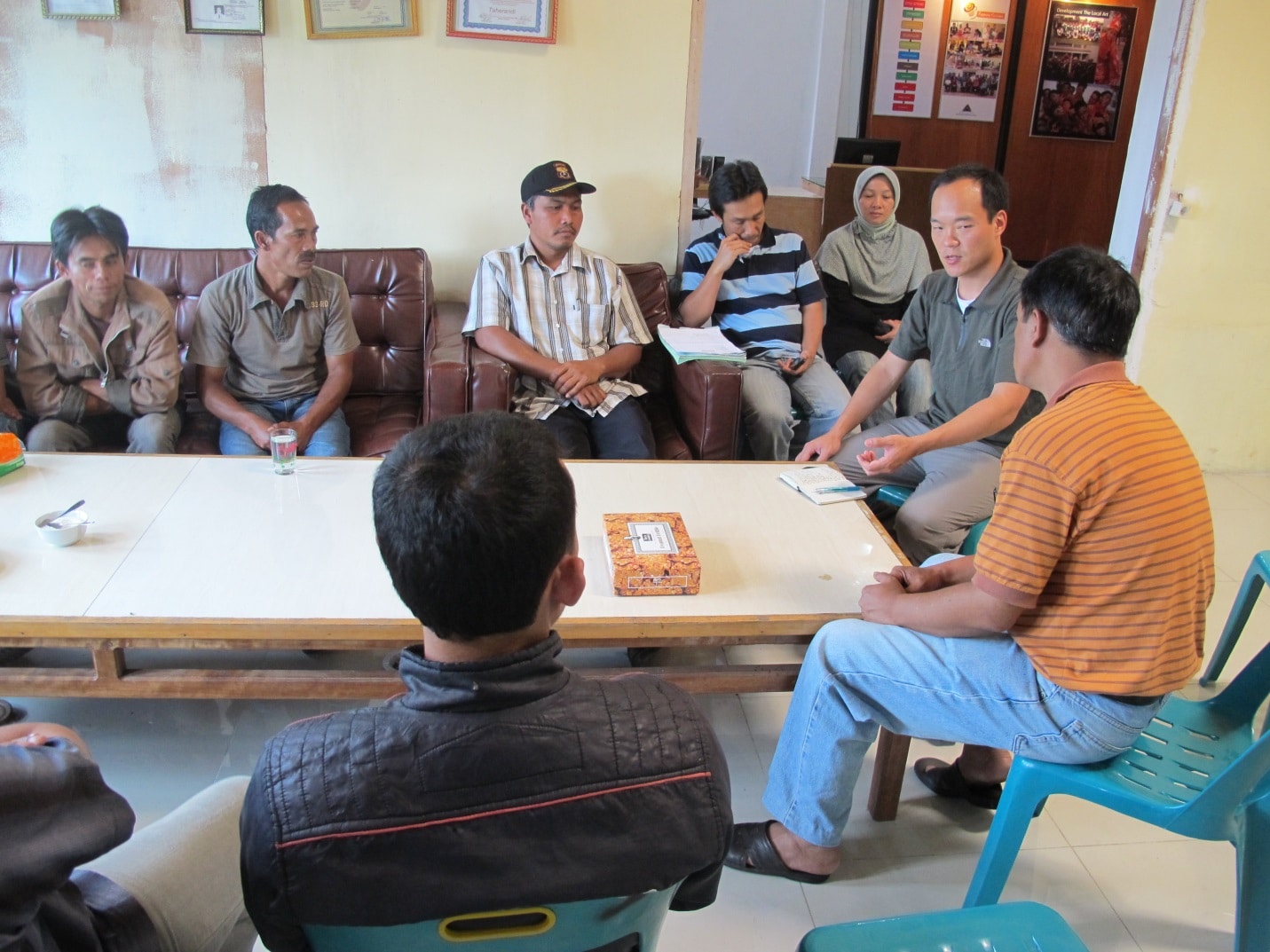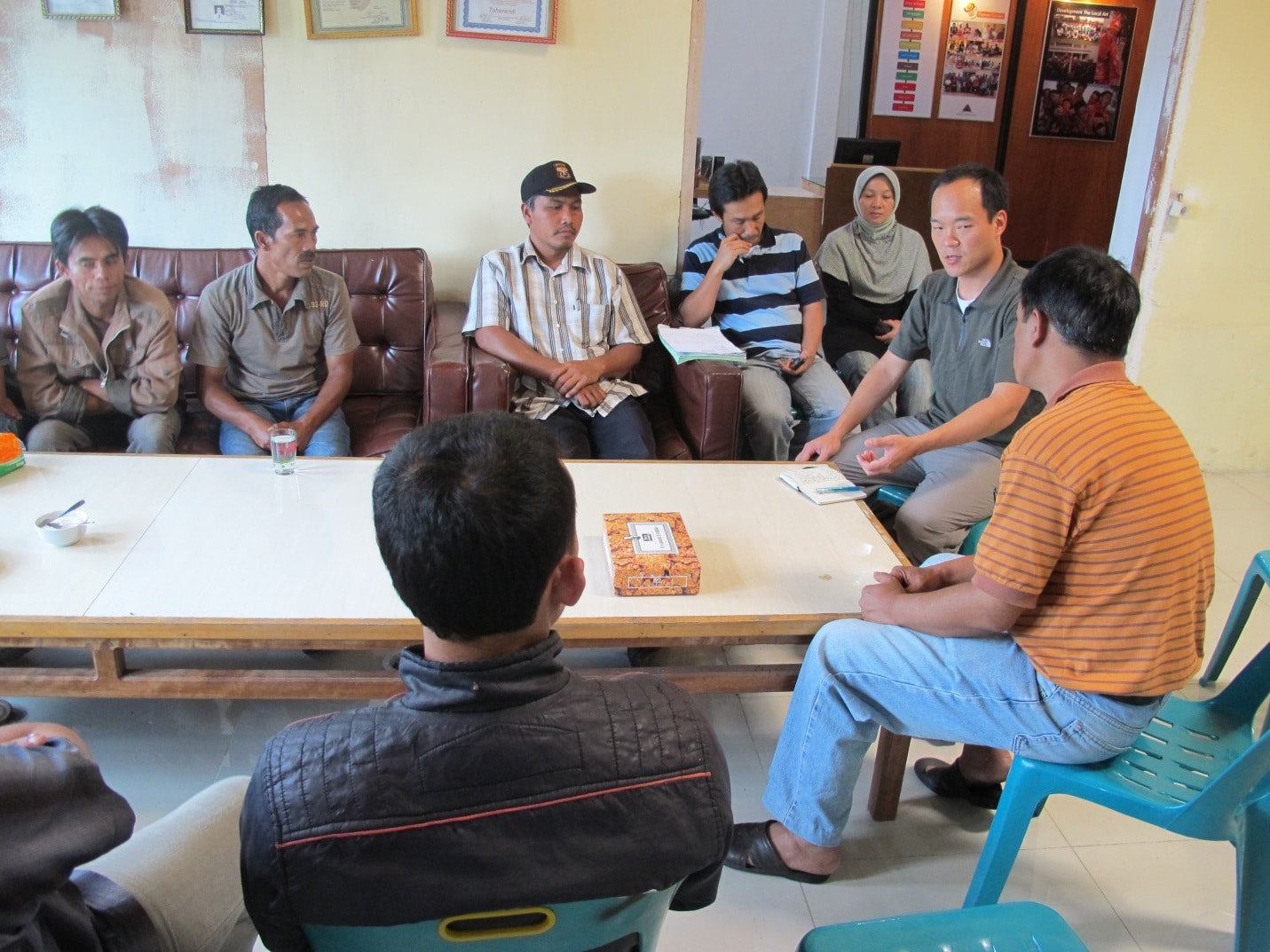
Al Liu, former board director of the Specialty Coffee Association of America (SCAA), is a true coffee connoisseur. As a trader and certified coffee specialist for Atlas Coffee Importers, Al has traveled extensively throughout the world’s coffee lands, including those in Indonesia – the latest country added to Root Capital’s growing roster of coffee-growing locales.
We recently sat down with Al to get a coffee insider’s perspective on the Indonesian coffee market, the country’s smallholder landscape and the significance of Root Capital’s new presence in Sumatra.
Al Liu (in green) with collectors at Koperasi Permata Gayo in Bener Meriah, Sumatra.
For the last 15 years, Root Capital has been focused lending to rural businesses in Latin America and Africa. We’ve just recently entered the Indonesia market, making loans to three coffee enterprises in Sumatra. Can you paint a picture of what the Sumatran coffee industry looks like? How does it compare to others, specifically those in Latin America and Africa?
The coffee industry in Sumatra is quite different from anything I have seen in the producing world. For one thing, the traditional cup profile is so unique that replacing a Sumatra as either a single-origin or a blend component can be challenging, to say the least. The Sumatra profile has become very popular in the U.S. specialty market so demand for it is consistently strong, particularly from a few leading specialty roasters who buy large volumes every year. As a result, any blips in the supply chain – whether real, projected, or rumored – coupled with high demand can cause the internal market to spike even without a corresponding increase in the international market price (known as the ‘C’ market). This phenomenon happened at the beginning of the 2010-11 harvest and then again during the 2013-14 harvest.
One of the main differences with the coffee industry in Sumatra is the dominance of “collectors” who buy washed coffee from small-scale producers, since there are very few large producers on the island. The collectors sometimes work on behalf of certain exporters but often will pit exporters against each other and see which one is willing to pay the highest price. Producers are very aware, especially with the proliferation of cell phones and texting, what the going price is for their coffee, forcing the collectors (including the ones representing Fair Trade cooperatives) to pay the going rate or risk losing out to competing collectors. This price does not include the Fair Trade social premium paid to cooperatives and farmers.
Do you foresee the introduction of credit from a lender like Root Capital affecting market dynamics at all?
Access to credit always has been a challenge for coffee cooperatives in the Gayo Highlands region of Aceh in northern Sumatra. Even if they can secure bank loans, the interest rate is often predatory, which can prevent the cooperative from having the necessary capital to invest in infrastructure improvements. Since stable coffee cooperatives in Sumatra are a relatively new phenomenon, with many having only four to five years of experience exporting to the specialty market (if not less), these groups often do not have alternatives to loans with high interest rates. Root Capital’s entry into Sumatra as a lender is significant because it gives qualified cooperatives better access to more affordable credit – a well-established practice in Latin America and now Africa, but not as much in Southeast Asia. A few other foreign lenders have made inroads into Sumatra but not on a broad scale.
It seems like there are tons of opportunities for impact and growth within Indonesia’s specialty coffee industry. How do you see Root Capital and Atlas advancing these opportunities?
Although Sumatra remains a tricky origin and likely always will be, I’m very optimistic about the quality of coffees that Atlas has been sourcing from there as well as the strength of the relationships that we have formed with multiple cooperatives and exporters. We recently developed a supply chain for our very first single-producer micro-lot from Sumatra for a roaster that has invested in a strong relationship with the farmer’s cooperative. It’s exciting to be working in such innovative ways with farmers in the region. We hope that the sale of this one producer’s coffee at a premium price – albeit a small volume – will inspire other producers to focus on improving and differentiating their superior quality coffees. Root Capital financing is helping to unlock new opportunities like these.
That’s really exciting. Are there specific challenges/roadblocks that might complicate that progress?
Ongoing volatility in the internal market probably is the biggest challenge that coffee buyers face in Sumatra. Much of the coffee is used as a blend component and often needs to fall within a certain price range, so it can be difficult for buyers to feel secure in their supply chains as well as in the pricing stability. Also, Indonesia is farther away from North America than Latin America and Africa which makes it more difficult to travel there from a distance on a regular basis. Being face-to-face is key to establishing and strengthening relationships – especially since there are significant linguistic and cross-cultural divides that aren’t as prevalent in other coffee-growing origins.
What does Root Capital’s presence in Indonesia mean for Atlas and other buyers?
I’m excited that Root decided to enter Indonesia not just because of the need for affordable financing, but also because Root’s due diligence processes give buyers like me the confidence that borrowers have sufficiently organized their financials and businesses according to Root’s high standards.
This is good for farmers, good for buyers, and ultimately good for fans of Sumatran coffees.
